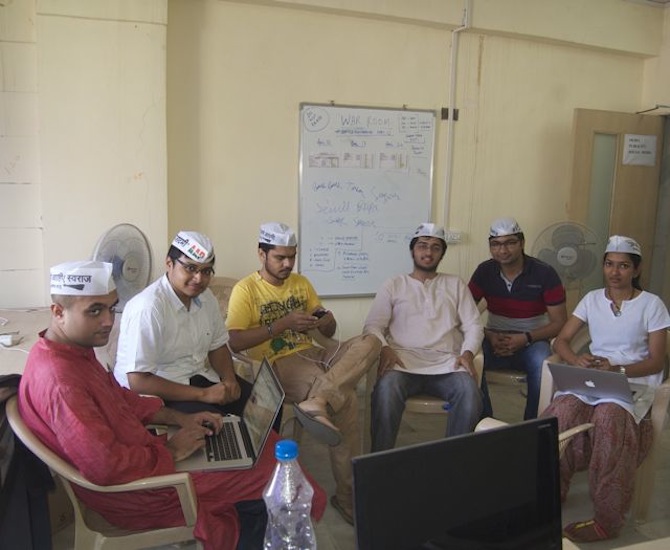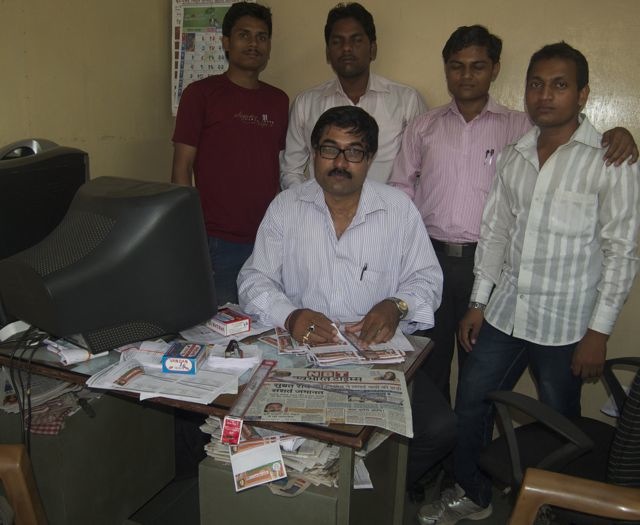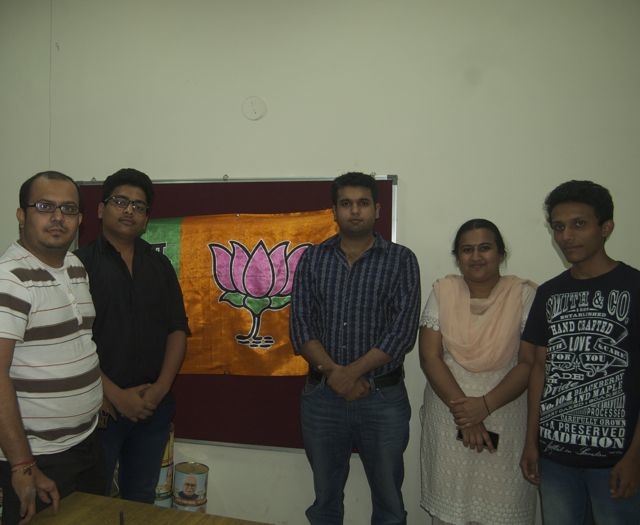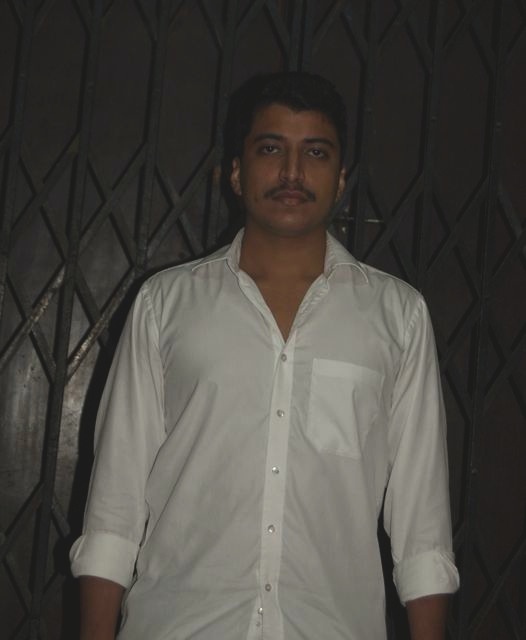Photographs: Prasanna D Zore/Rediff.com Prasanna D Zore/Rediff.com
No party can move ahead without the youth today: Abhijeet Deshmukh, Media Coordinator, Maharashtra Congress
The youth should lead us. We should be following them. The youth today is intelligent, capable, aware and more connected with ground realities. They inspire us to take on the corrupt system: Preeti Sharma Menon, Maharashtra State Secretary, Aam Aadmi Party
Young Indians have suddenly become the focus of political parties who have woken up to this potential vote bank.
Youngsters themselves have woken up to the fact that they can influence politics.
Ever since the Aam Aadmi Party led by Arvind Kejriwal was catapulted to the seat of power in Delhi riding on a wave of support from Delhi’s youth, the latter have come to occupy political mindspace like at no other time.
Every political party whatever its orientation, is currently using young people to shape, build and execute their political game plan.
Close to voting day in Mumbai on April 24, Rediff.com visited the offices of the AAP, the Bharatiya Janata Party and the Congress party in Mumbai to find out who these youth are.
What motivates them? How are they using their skills, energy and enthusiasm to mobilise voters, create awareness, and raise funds for their party?
Interestingly, most of them are in college or in their first job and are chipping in with 16 to 18 hours of voluntary work.
***
Paritosh Pant, Akshay Marathe, Anushka Shah, Rishabh Kedia and Nitin Singh are huddled in a group meeting at AAP’s office in Andheri East, a Mumbai suburb.
They are among 100 young volunteers at this Andheri centre who look after social media management, door-to-door campaigning, raising funds online and offline, offering logistic support to the party’s candidates in Mumbai, arranging media interactions and whatever else comes their way.
The average age is 23.
They rattle off statistics of pending criminal cases against candidates fielded by the Congress, BJP and its ally in Maharashtra, the Shiv Sena.
“Both the Congress and BJP are equally corrupt,” says Nitin Singh, 24, a software engineer, who has taken a two-month sabbatical to volunteer for the AAP.
Deeply influenced by Arvind Kejriwal’s honesty and transparency, Singh believes that the AAP has set very high standards in this general election by not fielding any candidate with a criminal background.
Singh handles AAP’s communication via social media. “It can be done on the go,” he says. “With a phone in your hand, you are in the game 24X7.”
Akshay Marathe is a first-year Bachelor of Arts student studying political science, economics and literature.
“Winning is not our chief intention,” he answers when asked about the winning chances of AAP’s candidates.
“This is AAP’s first election, not the last one as many believe,” chips in Anushka Shah, a graduate in government and economics from the London School of Economics.
Anushka works full-time for the NGO MagicBus that works in rural Thane in the field of skill development and employment.
The young volunteers are very clear about the road ahead for them and the one-year-old party they are supporting.
They are also very clear about the message that they as representative of AAP want the voter to understand.
“Don’t vote for a party. Vote for the candidate. Vote for a clean person,” advises Rishabh Kedia.
“We are here to set high standards, not just win elections by hook or by crook,” says this CA student who has come from Chhattisgarh to do his articleship in Mumbai.
“I work five days a week. The remaining two I dedicate to AAP. I am a ‘weekend worker’,” says Rishabh to laughter from his fellow volunteers.
Paritosh Pant, a hotel management graduate quit a decent job at a Mumbai five-star hotel recently to join the ‘AAP-wagon’.
“I want to devote all my time for party work and organisation-building,” says Paritosh.
He intends to start his own event management company after the Lok Sabha elections.
Despite their optimism, they know the limitations of a party that is contesting for the first time.
“Even if we don’t do well we will continue to create a platform for clean politicians. We will invest in building AAP in Maharashtra.
“After the Lok Sabha come the Vidhan Sabha (Legislative Assembly) elections in the state. This election will be like laying the groundwork,” says Paritosh?
Kindly click NEXT to continue reading
'Change is a must. Parivartar hi sansar ka niyam hai'
Image: Volunteers of Modi Yuva Shakti. From left: Ravi Kumar Banda, Rajesh Yadav, Sanjay Yadav and Prashant Mali; Centre: Local BJP worker Satya Pal Malik whose office these volunteers work from.Photographs: Prasanna D Zore/Rediff.com
A couple of kilometres away from AAP’s Andheri office, close to IIT Mumbai, a group of four energetic young men, all college-going, are working fiercely in a small 80 sq ft room.
They have a deadline to meet. Snuggled cozily at the border of two Lok Sabha constituencies, Mumbai North East and North Central, Sainath Nagar is a mixed neighbourhood that is home to chawls and tenements at one end and high-rise towers of the Hiranandanis at the other.
Ravi Kumar Banda, Rajesh Yadav, Prashant Mali and Sanjay Yadav are taking turns to separate cards belonging to the BJP greenhorn candidate, Poonam Mahajan, who is taking on Congress’s sitting MP Priya Dutt in the North Central constituency, and BJP veteran Kirit Somaiya who is pitted against sitting MP Sanjay Dina Patil of the Nationalist Congress Party from Mumbai North East.
Ravi is a TYBCom student. Rajesh is doing his MSc in IT from Mumbai University, and Prashant is a TYBSc student. Sanjay is studying mass communications and journalism.
All four are part of an initiative called ‘Modi for PM’ and ‘Modi Yuva Shakti’.
It is 4.30 pm and they have just had lunch. They have another 12 hours to separate the voter cards and begin delivering them at 10,000 homes a day.
Every political party distributes these cards that have the name of the voter, age, and booth number of their polling station to encourage voters to cast their vote on polling day.
“We will finish this by tomorrow evening,” says 25-year-old Rajesh pouring a cold drink into small plastic cups.
He worked for four months at a software firm in Dombivali, a suburb some 45 km away from where he lives in Andheri. “The salary was just Rs 4,000 and considering the distance I had to travel, it was not worth it,” he says.
Rajesh blames Prime Minister Manmohan Singh and UPA II for failing to pull the Indian economy out of the rut it has been in since 2008-9.
He is pinning his hopes on the one man he thinks is capable of delivering the goods.
“Modi sarkar economy ki kaaya palat degi (The Modi government will turn the economy around),” he says. He hopes to get a better job in the changed circumstances.
The four are part of 325 youth volunteers who have been canvassing in 35 colleges in the suburbs of Mumbai for Modi and the BJP.
“If Modiji comes to power he will secure our borders and internal security too,” says Sanjay.
They see a surfeit of opportunities in the economic sphere for youth like them who are “from lower middle class and educated” says Prashant Mali who wants to do a Master’s in science and later a doctorate.
“Change is a must. Parivartar hi sansar ka niyam hai (Transformation is a law of nature),” says Ravi.
Kindly click NEXT to continue reading
'We want Mumbai's voting percentage to increase hugely'
Image: Volunteers of Vote for India at the BJP office in Dadar, central Mumbai. From left: Jemin Panchal, Chinmay Pawar, Ashvani Ramchandani, Shweta Kadam and Sahil Shaikh.Photographs: Prasanna D Zore/Rediff.com
At the BJP's Dadar office, Jemin Panchal, Ashvani Ramchandani, Shweta Kadam and her husband Unmesh are busy working the phones. Shweta is a BJP office bearer, but the others are volunteers.
They have modelled an offline version of WhatsApp, a social networking app that eases communication between friends, acquaintances and total strangers.
Ashvani, an NRI and diamond jewellery trader has arrived from Dubai just to cast his vote for the BJP candidate from his constituency in Andheri.
The day after his arrival he teamed up with his friend Jemin and his group, calling up people who they think are party sympathisers but need further encouragement to come out and vote on April 24, the day the city goes to the polls.
The plan is simple: Get in touch with people who gave missed calls when the BJP ran a campaign in support of Narendra Modi as PM asking respondents to dial a given number.
This initiative has given them access to a huge database that is now being tapped. “Whoever gave a missed call is a Modi supporter,” says Jemin when asked if this is tantamount to cold calling, and nobody objects when they get a call.
A call can last from one minute to 15 minutes sometimes depending on the enthusiasm of the person called. At the end the person called is asked to get their friends to vote for the party.
“In a way we have a connect, a commonality -- and that is, that we all want Modiji to become our next prime minister,” Ashvani says.
The four between them have made 400-500 calls every day, urging people to vote and get at least 10 more people along with them to the polling station.
“We want Mumbai’s voting percentage to increase hugely. Our job is to encourage people to come out and vote. They may not vote for Modiji, but at least they will shun their laziness and come out to vote,” says Shweta.
Though there’s no guarantee that the people they contact will vote for the BJP, Jemin, a financial management graduate from Sydenham College, says, “We know people will vote for Modiji seeing his development and governance track record.”
Kindly click NEXT to continue reading
'I feel proud to voluntarily work for a party that is 129 years old now'
Image: Author and Congress volunteer Rahul Kamerkar at Tilak Bhawan, Congress's office at Elphinstone Road, MumbaiPhotographs: Prasanna D Zore/Rediff.com
Cross the bridge over the Western Railway, a network of rail routes that run from north to south or vice versa at Dadar. A 15-minute walk takes you to the office of the Congress party on the west side of this iron divide.
Twenty-three-year-old Rahul Kamerkar is just about to leave for a meeting after putting in about 10 hours at the Congress office.
He spent the time sending press releases, coordinating with media for interviews of city candidates, coordinating with various local units of the Congress party for organising election rallies and at times manning the election control room.
Studying in the final year of LLB, Rahul is the author of a self-help book, The Man’s Ultimate Guide to Popularity.
As a student of economics at Mithibai College in Vile Parle, in suburban Mumbai, Rahul sharpened his political skills as an activist of the National Students Union of India, the student wing of the Congress party.
Four years after finishing college he approached state Congress general secretary Advocate Ganesh Patil to allow him to intern at the Congress party’s office in Dadar.
“Whenever schedules were not crazy I would attend my LLB classes,” says Rahul about his internship with India’s oldest political party.
“I feel a lot of pride to announce to my colleagues that I voluntarily work for a party that is 129 years old,” he says.
He believes that the party he is working for will surprise political pundits “when results start tumbling out.”
“I am pretty confident that people will vote for the ideals the Congress party stands for no matter what the opinion polls forecast,” he says.





Comment
article